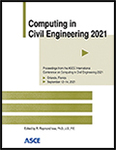Human Reliability Analysis and Prediction for Visual Inspection in Bridge Maintenance
Publication: Computing in Civil Engineering 2021
ABSTRACT
Visual inspection is the predominant practice used to determine the physical and functional conditions of bridges. Inspection processes typically require significant cognitive effort. Multiple bridge defects with various severity levels and locations could increase the cognitive demands of tasks. As a result, inspection records obtained from visual inspection often showed unpredictable errors. On the other hand, inspectors’ abilities to correctly identify defects can vary drastically among individuals and lead to different error rates in inspection reports. Personalized task performance predictions for individual inspectors are critical for proactively guiding bridge inspectors to avoid unique issues related to individuals’ nature. This study presents a personalized coach for bridge inspector (PCBI) training system that provides personalized predictions of an inspector’s performance in given tasks based on their behavioral traces in similar tasks. The predicted personal inspection task performance can help maintain a quality control system for bridge inspection. The authors developed a computer-simulated environment for bridge inspection processes to track inspectors’ cognitive behaviors and task performance. The authors analyzed and predicted inspectors’ performance individually using the personalized multi-linear regression (PMLR) model based on recorded cognitive patterns. Evaluation of the proposed model with the mean square error (MSE) between the actual and predicted performance achieved an MSE of 0.077. Finally, the authors compared human performance with state-of-the-art automated bridge inspection systems and discussed the effect of work experience on eye movement patterns.
Get full access to this article
View all available purchase options and get full access to this chapter.
REFERENCES
Bochkovskiy, A., Wang, C. Y., and Liao, H. Y. M. (2020). “YOLOv4: Optimal Speed and Accuracy of Object Detection.”.
Campbell, L. E., Connor, R. J., Whitehead, J. M., and Washer, G. A. (2020). “Benchmark for Evaluating Performance in Visual Inspection of Fatigue Cracking in Steel Bridges.” Journal of Bridge Engineering, 25(1), 04019128.
Connor, R. J., Dexter, R. J., and Mahmoud, H. (2005). “Inspection and Management of Bridges with Fracture-critical Details.”, Transportation Research Board, National Academy Press, Washington, DC.
Elbadrawy, A., Studham, R. S., and Karypis, G. (2015). “Collaborative Multi-regression Models for Predicting Students’ Performance in Course Activities.” Proceedings of the Fifth International Conference on Learning Analytics and Knowledge, ACM, Poughkeepsie New York, 103–107.
Gallwey, T. J. (1982). “Selection Tests for Visual Inspection on a Multiple Fault Type Task.” Ergonomics, 25(11), 1077–1092.
Hayes, T. R., and Petrov, A. A. (2016). “Pupil Diameter Tracks the Exploration–Exploitation Trade-off during Analogical Reasoning and Explains Individual Differences in Fluid Intelligence.” Journal of Cognitive Neuroscience, 28(2), 308–318.
Labelbox. (2021). Labelbox. <https://labelbox.com>. (Apr. 10, 2021).
Lin, T. Y., Maire, M., Belongie, S., Hays, J., Perona, P., Ramanan, D., Dollár, P., and Zitnick, C. L. (2014). “Microsoft COCO: Common Objects in Context.” Proceedings of the European Conference on Computer Vision (ECCV), Lecture Notes in Computer Science, Springer International Publishing, Cham, 740–755.
Mundt, M., Majumder, S., Murali, S., Panetsos, P., and Ramesh, V. (2019). “Meta-Learning Convolutional Neural Architectures for Multi-Target Concrete Defect Classification with the COncrete DEfect BRidge IMage Dataset.” Proceedings of the IEEE/CVF Conference on Computer Vision and Pattern Recognition (CVPR), Long Beach, CA, USA, 11196–11205.
Phares, B. M., Washer, G. A., Rolander, D. D., Graybeal, B. A., and Moore, M. (2004). “Routine Highway Bridge Inspection Condition Documentation Accuracy and Reliability.” Journal of Bridge Engineering, 9(4), 403–413.
Sadasivan, S., Greenstein, J. S., Gramopadhye, A. K., and Duchowski, A. T. (2005). “Use of Eye Movements as Feedforward Training for A Synthetic Aircraft Inspection Task.” Proceedings of the SIGCHI Conference on Human Factors in Computing Systems, ACM Press, Portland, Oregon, USA, 141–149.
See, J. E. (2012). “Visual Inspection: A Review of the Literature.”, Sandia National Laboratories, Albuquerque, New Mexico.
Information & Authors
Information
Published In
History
Published online: May 24, 2022
Authors
Metrics & Citations
Metrics
Citations
Download citation
If you have the appropriate software installed, you can download article citation data to the citation manager of your choice. Simply select your manager software from the list below and click Download.
